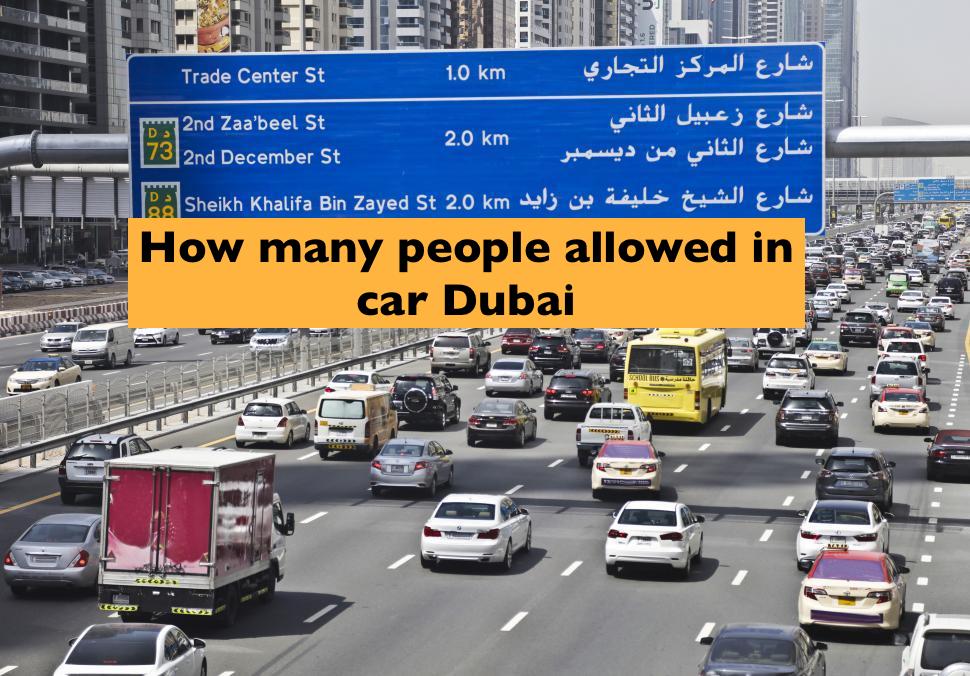Are you looking to drive around Dubai with your friends and family? Then you need to know the laws surrounding private cars in the UAE. It's essential to understand the passenger capacity limit for private cars in Dubai or Abu Dhabi today. In this article, we will explore the new law and what it means for you, as well as tips for avoiding fines for overcrowding in your car. We will also answer some of the most common questions, such as is it legal to drive in the UAE at 150 km/h, or is it legal to race in the UAE? So, if you want to stay safe and legal on the roads of the UAE, read on!
More read. How many people allowed in car Dubai – Zaibrid
The New Law
The New Law is an important law that dictates the number of people allowed in a car in Dubai. This law was implemented to ensure the safety and comfort of both drivers and passengers. According to this new law, only four passengers are allowed in a private car at any one time, including the driver. However, if your vehicle has more than four seats, you may be able to transport up to two additional passengers.Always abide by this rule whenever traveling by private car in Dubai for your own safety and convenience.
It is important to note that children under 10 years old do not count as a passenger when calculating the number of people allowed in a car. This means that parents can bring along their small children without worrying about exceeding the passenger capacity limit for their vehicles.
What This Means For You
If you are planning to drive your car in DubaI., The number of passengers allowed in a private car is essential among the diverse factors that must be taken into account. The authorities in the UAE have set guidelines for motorists and passengers to ensure their safety and comfort while operating a vehicle.The current legal limit on passenger capacity for cars registered in Dubai is 5 people, including the driver. This includes both adults and children, but infants who are below 3 years old do not count towards this limit. Additionally, all occupants must wear seatbelts at all times when traveling in a vehicle registered in these cities.
- It is important to note that any violation of these rules can lead to legal consequences such as fines or even jail time depending on the severity of the offense.
- Therefore, it is essential for motorists and passengers alike to know and abide by the laws concerning passenger capacity when traveling within Dubai.
- Drivers should always check their vehicles for any defects before driving them, especially if they plan on transporting multiple passengers at once. Doing so will help ensure everyone’s safety during their journey together!
Tips For Avoiding Fines For Overcrowding In Your Car
One sure way to avoid fines for overcrowding in your car is to know the legal passenger capacity limit of 5 people, including the driver. It is important to keep track of how many passengers are in your car at all times. Make it a habit to check that everyone has buckled up before you start driving and count how many passengers are present in the car. Additionally, if you are traveling with children under 3 years old, make sure they are properly secured in an appropriate child seat or booster seat so as not to be counted as adult passengers.
Moreover, it is important to check if your vehicle has been modified from its original design and can accommodate more than five passengers legally. If so, ensure that it meets all necessary safety requirements that have been specified by the authorities before carrying any extra passengers.
It’s also a good idea to pay attention to where you stop – certain locations such as residential areas may have their own regulations regarding overcrowding which could lead to fines even if you don’t exceed the passenger capacity limit of five people set by authorities in Dubai. Therefore, always stay aware of your surroundings and obey local laws regarding passenger capacity whenever possible.
Be mindful of this rule and follow all guidelines outlined by authorities whenever possible so as not to incur any legal consequences due to overcrowding violations.
Is It Legal to Drive in the UAE at 150 km/h?
The speed limits in the UAE are strict and vary depending on the type of road you are driving on. Generally speaking, on highways and expressways, the speed limit is 120 km/h while other roads have a limit of 90 km/h. It is illegal to drive faster than these limits as this endangers you and other drivers on the road.
Driving at 150 km/h (or any speed above 120 km/h) is against the law in Dubai or Abu Dhabi. If caught, drivers can be subject to fines and even jail time if they exceed the maximum limit by more than 40km/h. The authorities take these offenses seriously because high speeds increase the risk of accidents significantly which leads to serious injuries or fatalities for both parties involved.
Is It Legal to Race in the UAE?
Racing is a popular pastime in the UAE, but it comes with its own set of laws and regulations that must be followed. According to local authorities, any form of racing on public roads is strictly prohibited. This includes drag racing, drifting, or any other type of speed contest.
Is It Legal to Drive in the UAE at 150 km/h?
The speed limits in the UAE are strict and vary depending on the type of road you are driving on. Generally speaking, on highways and expressways, the speed limit is 120 km/h while other roads have a limit of 90 km/h. It is illegal to drive faster than these limits as this endangers you and other drivers on the road.
Driving at 150 km/h (or any speed above 120 km/h) is against the law in Dubai or Abu Dhabi. If caught, drivers can be subject to fines and even jail time if they exceed the maximum limit by more than 40km/h. The authorities take these offenses seriously because high speeds increase the risk of accidents significantly which leads to serious injuries or fatalities for both parties involved.
Is It Legal to Race in the UAE?
Racing is a popular pastime in the UAE, but it comes with its own set of laws and regulations that must be followed. According to local authorities, any form of racing on public roads is strictly prohibited. This includes drag racing, drifting, or any other type of speed contest.
Furthermore, races on private tracks must also abide by the rules and regulations stipulated by the relevant authority. Any person found participating in illegal races can face severe legal consequences such as hefty fines or even jail time.
The best way to race safely in the UAE is to attend an organized event at one of the country’s official drag strips or motorsports tracks. These events are organized by reputable clubs and organizations who enforce rules and safety regulations for all participants.
The best way to race safely in the UAE is to attend an organized event at one of the country’s official drag strips or motorsports tracks. These events are organized by reputable clubs and organizations who enforce rules and safety regulations for all participants.
To ensure that everyone has a safe and enjoyable experience, they will typically provide vehicles for drivers to use as well as adequate safety equipment such as helmets and fire-retardant overalls. The events are usually well-attended by experienced racers from around the region who can provide helpful advice for newcomers to the sport.
Racing simulators are becoming increasingly popular among novice drivers who want to practice their skills without risking serious injury or legal repercussions on real-world tracks or roads.
Racing simulators are becoming increasingly popular among novice drivers who want to practice their skills without risking serious injury or legal repercussions on real-world tracks or roads.









